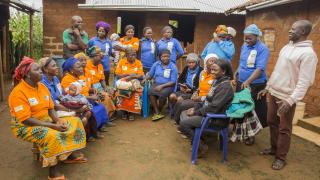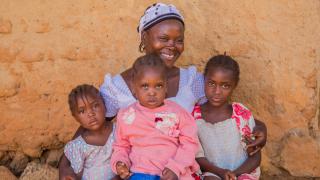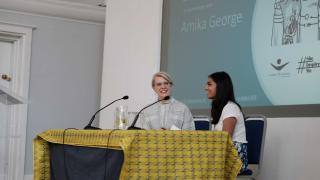How to make progress towards peace: 3 lessons I learned from women in Nigeria
The past few decades have seen significant progress against many development goals: extreme poverty has declined sharply, child mortality has been cut by more than half, and the majority of girls worldwide now finish primary school.
Yet this overall progress masks rampant inequalities. The most marginalised people on the planet still face extraordinary challenges – and in many cases, their burdens have increased.
During ten years working for Women for Women International, I’ve witnessed at first hand the plight of those who are getting left behind.
From Afghanistan to Kosovo, to the Democratic Republic of Congo, I’ve spoken to hundreds of women who are striving for progress for themselves and their families – but they face unimaginable barriers.
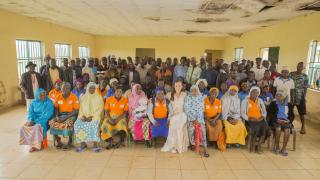
One critical factor in this uneven progress is the consistent decline in global peacefulness over the past ten years. Today, the World Bank estimates that 1.2 billion people, roughly one-fifth of the world's population, are affected by some form of violence or insecurity.
By 2030, fragile and conflict-affected countries will be home to 46% of the world’s extreme poor. People in conflict situations are more than twice as likely to be under-nourished, and more than three times as likely to be unable to send their children to school, as those in other developing countries.
Last August, I travelled to Riyom, in Nigeria’s volatile Plateau State, to meet women taking part in Women for Women International’s year-long training programme.
I came away having absorbed some key lessons about building sustainable peace in the most turbulent settings.
1. Equip women with the knowledge, skills and resources to empower themselves
For years, central Nigeria has been engulfed by fighting between herdsmen and farmers, driven by competition for land, as well as religious and ethnic divisions – herders are part of the Fulani ethnic group, who are predominantly Muslim, while farming communities are largely Christian.
In Riyom, I saw how women face a triple burden: extreme poverty, violent conflict, and deeply conservative gender norms that limit their opportunities. I also witnessed how, with the right support, empowered women become the bedrock of strong, stable and peaceful societies.
Women for Women International equips women to tackle the challenges through a holistic, one-year training programme where they learn to earn and save money, improve their family’s health and wellbeing, and make their voices heard at home and in their community.
Crucially, women from both Fulani Muslim and Christian farmer communities are enrolled together, in mixed classes of 25 – creating an unprecedented space for conversation and collaboration.
In 2018, on average, participants in our Nigeria programme increased their daily earnings from $0.35 at the time of enrolment to $2.25 at graduation.
The impact we see in just one year is dramatic. In 2018, on average, participants in our Nigeria programme increased their daily earnings from $0.35 at the time of enrolment to $2.25 at graduation – a 542% increase.
Women’s increased economic activity has a powerful multiplier effect, increasing spending on nutritious food, healthcare, and education – the building blocks of stable and prosperous societies. But it’s not just about money – knowledge, voice, and social networks are essential components of the training.
In 2018, on average, Nigeria participants’ knowledge of their rights grew by 93% over the course of the year, from 46% at enrolment to 89% at graduation.
Armed with this knowledge, women have the confidence to speak up against abuse and injustice, and take an active role in decision-making. This helps to address the root causes of conflict and strengthen the social fabric of communities.
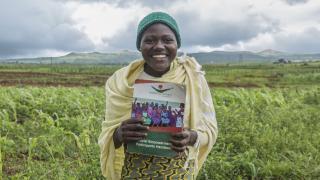
Armed with this knowledge, women have the confidence to speak up against abuse and injustice, and take an active role in decision-making.
2. Include women as active participants in every aspect of peacebuilding
Women’s voices are critical to forging sustainable peace in volatile settings like Riyom.
As well as bringing women from both sides together in our training programmes, Women for Women International has been supporting women’s groups in communities across Plateau State to take the lead in driving social change.
We’ve been training women as Change Agents – advocates for marginalised women and girls, who identify major problems and barriers in their communities, and work with local leaders to find solutions.
In Riyom, that means involving husbands and fathers, religious leaders, and community elders – men who hold the power and can influence social norms about gender roles.
Through our Men’s Engagement Programme, which is led by local men, Women for Women International does just that, and we have seen substantial changes in men’s attitudes and behaviours as a result – such as willingness to send daughters to school, involve women in household financial decisions and take on leadership roles in the community.
On a global level, action is needed too. Given the proven links between gender equality and peace, it is disheartening that in recent years, out of the overall aid budget for conflict-affected and fragile countries, only 5% was allocated to programmes targeting gender equality and women’s empowerment as the primary objective.
We urgently need more investment in these long-term, proven approaches to building peace.
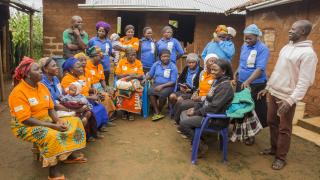
Women must be actively and meaningfully involved at all stages and all levels of the process.
The current climate of stability and trust I witnessed in Riyom can be directly attributed to the efforts of a group of Change Agents, who organised and mediated a peace dialogue that brought together representatives from both sides.
With the support of local authorities, they forged a peace agreement, which has been successful - in the last six months, the fighting has stopped, children are going back to school, crops and cattle are safe, families’ economic wellbeing has improved, and people who had fled the region are returning.
Yet the inclusion of women in peacebuilding is not the norm. Between 1990 and 2017, women constituted only 2% of mediators, 8% of negotiators, and 5% of witnesses and signatories in all major peace processes. This is despite evidence that when women participate, peace talks are more successful, and peace agreements are more sustainable.
It’s not enough to have a token female voice at the table in high-level peace talks. Women must be actively and meaningfully involved at all stages and all levels of the process – and that starts with community initiatives like those pioneered by Change Agents in Riyom.
3. Address the root causes of conflict by shifting power and transforming social norms
I was so impressed to see women in Riyom taking matters into their own hands, and the remarkable progress they have achieved against all the odds stacked against them. But women can’t do this job on their own, nor should they have to.
According to the World Bank, the larger a country’s gender gap, the more likely it is to be affected by conflict. The work of building a more gender equal society, where women are valued the same and can access the same opportunities as men, should therefore, be an urgent priority – and it needs everyone’s active participation.
In Riyom, that means involving husbands and fathers, religious leaders, and community elders – men who hold the power and can influence social norms about gender roles.
Through our Men’s Engagement Programme, which is led by local men, Women for Women International does just that, and we have seen substantial changes in men’s attitudes and behaviours as a result – such as willingness to send daughters to school, involve women in household financial decisions and take on leadership roles in the community.
On a global level, action is needed too. Given the proven links between gender equality and peace, it is disheartening that in recent years, out of the overall aid budget for conflict-affected and fragile countries, only 5% was allocated to programmes targeting gender equality and women’s empowerment as the primary objective.
We urgently need more investment in these long-term, proven approaches to building peace.
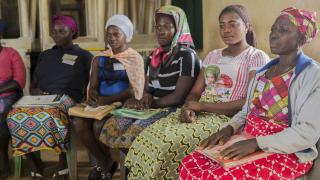
Building a more gender equal society should be an urgent priority.
I was deeply inspired by the women I met in Riyom – not only by their tireless dedication to improve their own and their families’ lives, but by their commitment to bridging religious and ethnic divides, to fostering forgiveness and reconciliation, and to building a more secure future for their communities that will benefit everyone.
Too often, women in conflict situations are represented as passive, silent victims. In Riyom, I met individuals with incredible drive and potential, desperate to seize control of their own lives and achieve their goals.
Working together, they are a formidable force for positive change in the world’s most challenging settings.
Today’s spiralling conflicts represent a severe impediment to development progress.
There’s never been a more important time to invest in women who are being directly affected, to include them in peacebuilding efforts, and to push for gender equality.
This blog was originally posted on Oxford Women in Business.
Continue reading
Zainab Gbobaniyi is a lawyer and advocacy trainer with Women for Women International. Here she tells us about her life-long passion for women's rights and how she's working to give marginalised women a voice.
Today, on International Day of the Girl Child, and every day, Women for Women International strives to lift women to achieve their greatest potential both financially and socially so that they can lift their daughters in turn.
The Global Goals are so incredibly important in helping us to clearly identify the global challenges we face. We can all take one goal that resonates with us, and strive to tackle it in our own way, in our homes, schools, workplaces or communities.


